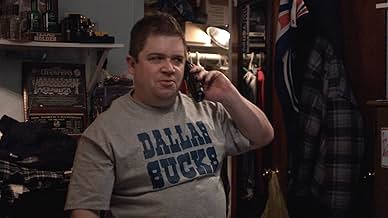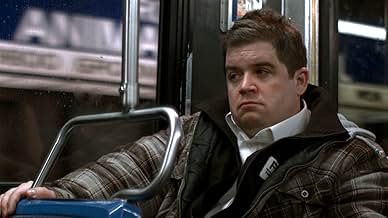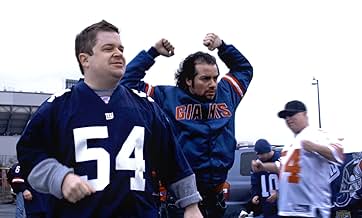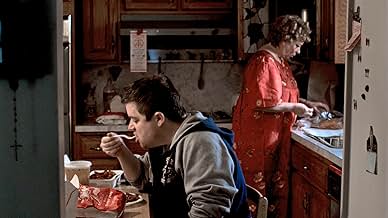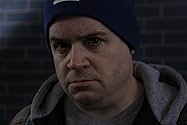IMDb-BEWERTUNG
6,6/10
10.109
IHRE BEWERTUNG
Ein eingefleischter Fan der New York Giants kämpft mit den Folgen, wenn er von seinem Lieblingsspieler verprügelt wird.Ein eingefleischter Fan der New York Giants kämpft mit den Folgen, wenn er von seinem Lieblingsspieler verprügelt wird.Ein eingefleischter Fan der New York Giants kämpft mit den Folgen, wenn er von seinem Lieblingsspieler verprügelt wird.
- Auszeichnungen
- 1 Gewinn & 5 Nominierungen insgesamt
Sidné Anderson
- Hospital Doctor
- (as Sidne Anderson)
Empfohlene Bewertungen
"Big Fan" is an unpleasant movie about an extremely unpleasant man.
Patton Oswalt plays a dumpy 37-year-old loser who lives with his mother and spends his life living vicariously through the glories of the New York Giants. On a night out on the town, he and his buddy catch sight of their favorite player and follow him to a nightclub. When they approach him, a misunderstanding leads to Oswalt getting badly beaten by him. But he refuses to take legal action against him despite the admonishments of his family, because he'd rather see his favorite player able to lead his team to a win than seek remuneration for himself.
"Big Fan" starts out as a low-key comedy, but gradually picks up dark overtones and seems like it's going to take its audience to some uncomfortable places. Oswalt's character comes across as a schlubby but mostly decent guy at first, but as the movie progresses, we start to wonder if he might be mentally unhinged. However, a cop-out ending lurches the film back into uneasy dark comedy, and basically asks us to find Oswalt's character endearing even though he's been nothing but off putting.
The tone is all over the place, the comedy never really working. If the film had acknowledged that Oswalt's character is a loser, and made some kind of point about the fine line that begins to separate hobby from obsession, it might have been more interesting. But it instead asks us to take his side, and seems to take the stance that his obsession is just the healthy interest of your everyday man-child. The movie goes out of its way to make Oswalt's family into obnoxious caricatures, and we're not supposed to like them because they think he needs to get a life, but guess what....his family seemed to me to make a lot of sense.
Pretty much the definition of a misfire.
Grade: C
Patton Oswalt plays a dumpy 37-year-old loser who lives with his mother and spends his life living vicariously through the glories of the New York Giants. On a night out on the town, he and his buddy catch sight of their favorite player and follow him to a nightclub. When they approach him, a misunderstanding leads to Oswalt getting badly beaten by him. But he refuses to take legal action against him despite the admonishments of his family, because he'd rather see his favorite player able to lead his team to a win than seek remuneration for himself.
"Big Fan" starts out as a low-key comedy, but gradually picks up dark overtones and seems like it's going to take its audience to some uncomfortable places. Oswalt's character comes across as a schlubby but mostly decent guy at first, but as the movie progresses, we start to wonder if he might be mentally unhinged. However, a cop-out ending lurches the film back into uneasy dark comedy, and basically asks us to find Oswalt's character endearing even though he's been nothing but off putting.
The tone is all over the place, the comedy never really working. If the film had acknowledged that Oswalt's character is a loser, and made some kind of point about the fine line that begins to separate hobby from obsession, it might have been more interesting. But it instead asks us to take his side, and seems to take the stance that his obsession is just the healthy interest of your everyday man-child. The movie goes out of its way to make Oswalt's family into obnoxious caricatures, and we're not supposed to like them because they think he needs to get a life, but guess what....his family seemed to me to make a lot of sense.
Pretty much the definition of a misfire.
Grade: C
Big Fan stands as a profound and thoroughly remarkable character study marked by a magnetic performance of Patton Oswalt. He excels as Paul Aufiero, a life-long fan of New York Giants being brutally hit by one of Giants' top players in a strip club. Oswalt is equally sympathetic and believable starring as this deeply troubled character. His performance is the chief, but thankfully not the only reason to see Big Fan. Writer-director Robert Siegel regards the sports fanaticism as an addiction and that gives his film the necessary gravitas: its power and its credibility. The script is devoid of clichés with many well-observed situations thrown in and several ingenious twists you won't see coming. As a result, you observe Paul falling into decay with great anxiety combined with care. Siegel crafts a subversive comedy, funny and bleak in equal measures. It also works as a peculiar take on the pathology of sports mania.
Paul is in his mid-thirties, single, and still living at home with his mother. He works as a parking lot attendant in New York, and is content to sit in his booth at night writing down passionate, articulate rants, so that when he goes home he can call a local radio sports show and prove his fanaticism for the Giants, his favorite football team.
Paul is played by Patton Oswalt, one of the funniest stand-up comedians alive, and what he does in this film is really quite remarkable. He creates a fully convincing and pathetic loser, and is unafraid to reveal all the character's lowest points. If this were an Adam Sandler comedy we'd probably have scenes showing us how misunderstood and sweet Paul is, so we can understand that he's the one we're meant to root for, but Oswalt's Paul isn't so cleancut. He treats his family like crap and has terrible mood swings; he only seems truly happy when he's in his element: either witnessing a Giants win or ranting to strangers on the radio. The fact that he must write his speeches down beforehand, and preps himself for hours in advance of calling, says everything.
Paul gets in trouble when he spots a Giants quarterback at a gas station in a shady neighborhood and follows him into a NYC nightclub. After an awkward introduction, Paul makes the mistake of mentioning that he's been following the sports star and his entourage for the past few hours, and the drunken athlete reacts by beating him senseless. Three days later Paul is hospitalized and the police want his statement -- but he suddenly "can't remember" anything that happened, desperately hoping the Giants won't be forced to suspend their star athlete. But that's just the beginning of his problems.
Big Fan is the directorial debut of Robert D. Siegel, who wrote last year's sports-themed The Wrestler. Both movies concern the plights of apparent losers, the biggest difference being Mickey Rourke's 'Ram' actually had a life at one point, whereas Paul's existence is experienced vicariously. Everyone around him tries to offer a better life, whether it's jobs or moving into his own place, but he firmly rejects them. In Paul's eyes, this is his life. He is perfectly content to be discontent, and the movie's lack of transformation for its character will undoubtedly alienate some viewers.
And, put bluntly, Big Fan is not as strong or poignant as The Wrestler. Siegel is not as capable a director as Darren Aronofsky, and the story -- despite clocking in at under an hour and a half -- does tend to meander a few times. But it is endearingly bleak, honest and real, and kept afloat by Oswalt's fascinating performance, which is hard to shake off even after the credits are over.
Paul is played by Patton Oswalt, one of the funniest stand-up comedians alive, and what he does in this film is really quite remarkable. He creates a fully convincing and pathetic loser, and is unafraid to reveal all the character's lowest points. If this were an Adam Sandler comedy we'd probably have scenes showing us how misunderstood and sweet Paul is, so we can understand that he's the one we're meant to root for, but Oswalt's Paul isn't so cleancut. He treats his family like crap and has terrible mood swings; he only seems truly happy when he's in his element: either witnessing a Giants win or ranting to strangers on the radio. The fact that he must write his speeches down beforehand, and preps himself for hours in advance of calling, says everything.
Paul gets in trouble when he spots a Giants quarterback at a gas station in a shady neighborhood and follows him into a NYC nightclub. After an awkward introduction, Paul makes the mistake of mentioning that he's been following the sports star and his entourage for the past few hours, and the drunken athlete reacts by beating him senseless. Three days later Paul is hospitalized and the police want his statement -- but he suddenly "can't remember" anything that happened, desperately hoping the Giants won't be forced to suspend their star athlete. But that's just the beginning of his problems.
Big Fan is the directorial debut of Robert D. Siegel, who wrote last year's sports-themed The Wrestler. Both movies concern the plights of apparent losers, the biggest difference being Mickey Rourke's 'Ram' actually had a life at one point, whereas Paul's existence is experienced vicariously. Everyone around him tries to offer a better life, whether it's jobs or moving into his own place, but he firmly rejects them. In Paul's eyes, this is his life. He is perfectly content to be discontent, and the movie's lack of transformation for its character will undoubtedly alienate some viewers.
And, put bluntly, Big Fan is not as strong or poignant as The Wrestler. Siegel is not as capable a director as Darren Aronofsky, and the story -- despite clocking in at under an hour and a half -- does tend to meander a few times. But it is endearingly bleak, honest and real, and kept afloat by Oswalt's fascinating performance, which is hard to shake off even after the credits are over.
"Big Fan" is about Paul (Patton Oswalt) who is a really big fan of the New York Giants. It's a simple premise and one that you think you see on a regular basis. But this movie is different because we really meet Paul, on a very personal level. We see everything in his life that makes him who he is. Even though Paul takes the word "fanatic" to a very serious level, he's accessible and it seems very real.
It's really slow moving because we basically just follow Paul around as he lives his very lowly life, everything revolving around the Giants, and listens to sports talk radio. I was completely riveted. This is a character study at the highest level. It doesn't use sex or drugs or big-budget action to get us interested, only Paul himself. And a little bit of football talk.
This is a darkly comic, but also very real, introspection of a sports fan. Every aspect of Paul had thought put into including interactions with and characteristics of all his family members and friend(s). "Big Fan" is the best mix of character study and sports, written at a very high level.
The director and screenwriter, Robert Siegel, also wrote "The Wrestler" which I was not a big fan of. Although it was critically acclaimed, I feel that "Big Fan" actually accomplishes what "The Wrestler" was supposed to - a soul-fulfilling examination of what sports can do to some people. The humour echos the realness and intelligence found in the The Onion - Siegel was an editor in chief. That should just reinforce the recommendation to see this movie.
It's really slow moving because we basically just follow Paul around as he lives his very lowly life, everything revolving around the Giants, and listens to sports talk radio. I was completely riveted. This is a character study at the highest level. It doesn't use sex or drugs or big-budget action to get us interested, only Paul himself. And a little bit of football talk.
This is a darkly comic, but also very real, introspection of a sports fan. Every aspect of Paul had thought put into including interactions with and characteristics of all his family members and friend(s). "Big Fan" is the best mix of character study and sports, written at a very high level.
The director and screenwriter, Robert Siegel, also wrote "The Wrestler" which I was not a big fan of. Although it was critically acclaimed, I feel that "Big Fan" actually accomplishes what "The Wrestler" was supposed to - a soul-fulfilling examination of what sports can do to some people. The humour echos the realness and intelligence found in the The Onion - Siegel was an editor in chief. That should just reinforce the recommendation to see this movie.
Well Patton Oswalt is a funny guy. I like his comedy and he's got a unique personality. This film is not exactly funny. It's written by the guy who wrote The Wrestler and its similar to it in many ways. He also directs for the first time and it's like he just followed the same mood that Darron Aronofsky used. Here we got the guy who's a football nut calling into to a radio show to boost his ego because he lives with his mom, he has one friend he hangs out with and they go to watch football in the parking lot of the NY Giants because they can't afford to get in. He's the Big Fan of the quarterback of the Giants and calls in to the local radio show to talk trash about any team playing them. Especially the Philly Eagles. HE practices his calls while working his crappy job as a parking lot attendant. The film drags a bit and the highlight is when he confronts a Phillies fan with a grudge. He's a loser going nowhere. And that is his goal. As well as that of the film. Now, where the Wrestler told an underdog story about a guy trying to get back in the game after his life turns out bad and lonely. This film is about resisting any change no matter how sorry the situation. I so want to like Patton doing a dark comedy, a little more humor and some kind of character build would have helped and proved Patton can act. It fizzles away before I can even decide what to think about it.
Wusstest du schon
- WissenswertesDirector Robert Siegel has said that between takes in the strip club, while other members of cast and crew were enjoying the company of dancers, actor Patton Oswalt was watching episodes of John Adams - Freiheit für Amerika (2008) on his iPod in a private room.
- PatzerWhen Paul is reading the newspaper about the Giants' actions regarding the suspended player, two short paragraphs are repeated several times to give the appearance of more news copy.
- Zitate
Paul Aufiero: He was rusty.
- SoundtracksOoh Poo Pah Doo
Written by Jessie Hill
Performed by Mitch Ryder & The Detroit Wheels
Courtesy of Rhino Entertainment Company
By Arrangement with Warner Music Group Film & TV Licensing
Top-Auswahl
Melde dich zum Bewerten an und greife auf die Watchlist für personalisierte Empfehlungen zu.
- How long is Big Fan?Powered by Alexa
Details
- Erscheinungsdatum
- Herkunftsland
- Offizieller Standort
- Sprache
- Auch bekannt als
- Paul Aufiero
- Drehorte
- Produktionsfirmen
- Weitere beteiligte Unternehmen bei IMDbPro anzeigen
Box Office
- Bruttoertrag in den USA und Kanada
- 234.540 $
- Eröffnungswochenende in den USA und in Kanada
- 24.266 $
- 30. Aug. 2009
- Weltweiter Bruttoertrag
- 234.540 $
- Laufzeit
- 1 Std. 28 Min.(88 min)
- Sound-Mix
- Seitenverhältnis
- 1.85 : 1
Zu dieser Seite beitragen
Bearbeitung vorschlagen oder fehlenden Inhalt hinzufügen


